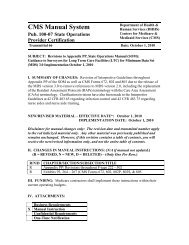LOUISIANA Community Mental Health Services Block Grant ...
LOUISIANA Community Mental Health Services Block Grant ...
LOUISIANA Community Mental Health Services Block Grant ...
Create successful ePaper yourself
Turn your PDF publications into a flip-book with our unique Google optimized e-Paper software.
pledged on-going pro-bono consultation to assist Louisiana in developing cultural and linguistic<br />
competencies. NAMBHA utilized the Center for <strong>Mental</strong> <strong>Health</strong> <strong>Services</strong>‟ nine guiding principles for<br />
cultural competence in disaster mental health programs as their guide, as well as data and information<br />
gathered from focus groups. One of the primary learning objectives was to train staff that cultural<br />
and linguistic competence is a journey and a process; and the most ardent champion spends a lifetime<br />
acquiring skills that continue to make them more culturally competent. Unfortunately, due to<br />
budgetary constraints and loss of personnel, this committee has for all practical purposes become<br />
dormant. It is hoped that in the near future, the committee will become active once again.<br />
OBH continues to explore is ability and capacity to expand the provision of evidence-based practices<br />
(EBPs). The state has isolated pockets where evidence-based practices are in place, but in the past,<br />
the practices have not been brought to a state-wide scale. In an effort to ameliorate this problem,<br />
during 2009-10, statewide EBP trainings have been offered to educate clinicians on such topics as<br />
Dialectical Behavior Therapy and Cognitive Behavior Therapy.<br />
Crisis intervention and the development of resiliency in children and youth is an important area of<br />
need. In an effort to begin to address this need, the Child/Adolescent Response Team (CART) was<br />
developed. The CART response process is a time-limited series of crisis intervention steps. The six<br />
phases of the CART approach to crisis intervention consists of a cluster of services available to<br />
children and families initiated through a crisis phone line. The crisis plan establishes a time-line<br />
addressing all necessary elements (i.e., least restrictive setting issues, family supports, transportation,<br />
etc.) and includes a plan to link the family back to any pre-existing resources or new resources as<br />
needed. There are now crisis services for children statewide, although two LGEs (JPHSA and<br />
FPHSA) utilize their own model of crisis intervention for children.<br />
The Louisiana Department of <strong>Health</strong> and Hospitals and the American College of Obstetricians and<br />
Gynecologists – Louisiana Section has a relatively new program designed to address poor birth<br />
outcomes in Louisiana. The Louisiana Screening, Brief Intervention, Referral, and Treatment<br />
(SBIRT) – <strong>Health</strong> Babies Initiative is designed to reduce the use of alcohol, tobacco and illicit drug<br />
use during pregnancy. The program also screens and provides appropriate referral for domestic<br />
violence, depression in pregnancy and inadequate parenting. The initiative is different from, but<br />
designed to work in concert with, specialized or traditional treatment. Historically, the primary focus<br />
of specialized treatment has been targeted toward persons with more severe substance use or those<br />
who have met the criteria for a Substance Use Disorder. SBIRT, however, targets those individuals<br />
with non-dependent substance use and provides effective strategies for intervention prior to the need<br />
for more extensive or specialized treatment. Mechanisms are also in place to refer those with the<br />
greatest addiction severity to specialized treatment. A pregnant woman's concern for her unborn<br />
child often motivates her to respond positively to her medical provider‟s advice. Therefore, the longterm<br />
goals of the Louisiana SBIRT initiative are to screen all pregnant Louisiana women at the site of<br />
prenatal care within both, public and private health facilities; and incorporate screening as a routine<br />
part of prenatal care. The Louisiana SBIRT-<strong>Health</strong>y Babies Initiative began as a partnership with the<br />
Office of Addictive Disorders and the Office of Public <strong>Health</strong> within the Louisiana Department of<br />
<strong>Health</strong> and Hospitals, the American College of Obstetricians and Gynecologists (ACOG), March of<br />
Dimes, Fetal Infant Mortality Review and The Louisiana Campaign for Tobacco-Free Living.<br />
Additional programs are also in place that address the need for a more integrated approach to care.<br />
Although the separation of treatments for mental illness and substance abuse is still all too common<br />
in the state, the reorganization of the two separate offices into the Office of Behavioral <strong>Health</strong> is<br />
PART C <strong>LOUISIANA</strong> FY 2011 PAGE 74<br />
SECTION II: ADULT & CHILD/ YOUTH<br />
IDENTIFICATION & ANALYSIS OF SERVICE SYSTEM’S STRENGTHS, NEEDS, & PRIORITIES<br />
UNMET SERVICE NEEDS & PLANS TO ADDRESS UNMET NEEDS
















